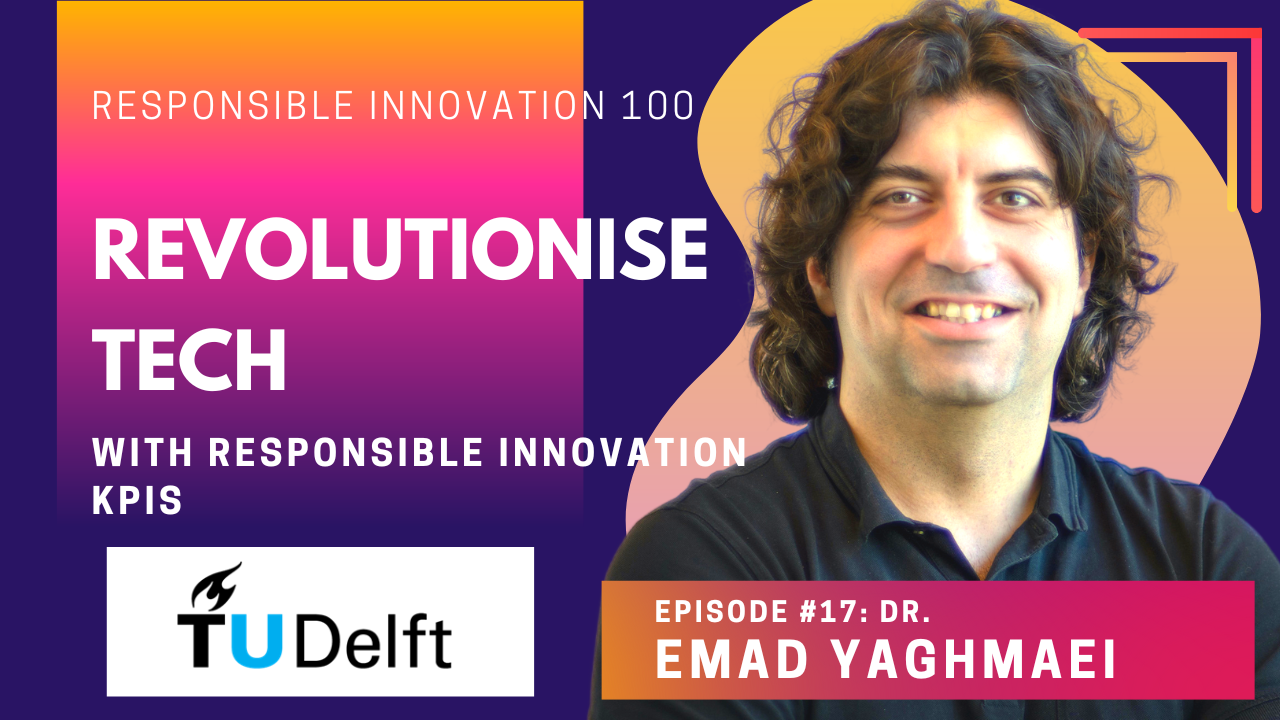How Can We Track, Assess and Improve Responsible Innovation in Business | Dr. Emad Yaghmaei
“If you do irresponsible innovation, you lose the margin, you lose these backward-looking indicators. The companies...they are not going to be responsible because you talk about responsible innovation principles. They are going to be responsible because they are afraid of the cost and risk of being irresponsible.”
Watch Full Episode
Emad Yaghmaei, Senior Researcher at University Delft and Managing Director of consulting firm YAGHMA B.V. provides a deep dive into responsible innovation impact assessment and monitoring methods.
Topics covered:
Innovation is a vital driver of progress and growth in modern businesses, but responsible innovation has become increasingly important in recent years. This approach emphasises the consideration and balance of social, ethical, environmental, legal, and governance issues during the innovation process. In a recent interview with Emad Yaghmaei, five key takeaways emerged:
Responsible innovation is essential for sustainable business: Companies need to balance innovation with social responsibility, ethical considerations, and environmental impact to ensure long-term viability.
Assessing and improving social performance is critical: Evaluating and enhancing a company's social performance ensures that its innovations benefit society while minimising potential harm.
Responsible innovation methodologies can integrate with existing performance assessment efforts: Responsible innovation methodologies can support other initiatives, such as UN Sustainable Development Goals and Corporate Social Responsibility.
Emphasise communication in discussions of responsible innovation: Building trust and rapport with businesses by emphasising open communication is critical.
The materiality matrix can help prioritise material issues: This tool helps companies assess the impact of their activities on society and the environment and prioritise issues accordingly.
To effectively integrate responsible innovation principles into a company's Key Performance Indicators (KPIs), it's essential to understand the existing indicators that the company is already using. Most businesses have either backward-looking KPIs, such as margin or incidents, or forward-looking KPIs, such as brand value, customer engagement, and customer satisfaction. Connecting responsible innovation principles to these existing indicators is the best way forward, as it helps bridge the gap between the two. Creating a new KPI for the company can be challenging to convince them to embed, so it's better to understand what is most important to the company and try to connect and embed responsible innovation principles and indicators within these existing indicators, especially forward-looking ones. Responsible innovation has much to offer regarding forward-looking indicators, as it can improve stakeholder engagement, customer satisfaction, and, ultimately, brand value. However, connecting responsible innovation principles to backward-looking indicators focused on short-term financial gain can be more challenging. To address this, it may be necessary to discuss the negative impact of irresponsible innovation and its associated risks and costs. While there is a risk of greenwashing or ethics washing, it's important to guide companies towards responsible innovation without pushing them toward superficial gestures that don't address the underlying issues. It's also essential to distinguish between backward-looking indicators that focus on risk and cost and forward-looking indicators that focus on impact and being good. While it's necessary to have both indicators, businesses may be more likely to prioritize the backward-looking indicators unless there is an apparent financial gain associated with the forward-looking ones. More than talking about brand value and being good is needed to convince businesses to prioritize responsible innovation in the long term, so it's crucial to connect it to financial gain and existing indicators.
About Emad:
Emad Yaghmaei is a Senior Researcher at the Faculty of Technology, Policy and Management at the Delft University of Technology and Managing Director of YAGHMA B.V. His research interests cover innovation management issues arising from the intersections of science, technology, and society. The emphasis of his research and consulting works is on innovation and technology management of emerging technologies such as Artificial Intelligence (AI) to identify and work on the social impacts of those technologies. He has been working on monitoring companies’ business innovation across their non-financial issues and creating real value for their business, customers, and business partners. He is currently focusing on UN Sustainable Development Goals (SDGs) and EU Responsible Research and Innovation (RRI) principles in an industrial context to demonstrate how the industry can work productively together with societal actors and integrate methodologies of RRI and business disclosures of SDGs into research and innovation processes.
Learn more about Megan:
Professional profile: https://www.tudelft.nl/tbm/onze-faculteit/afdelingen/values-technology-and-innovation/people/postdocs/dr-e-emad-yaghmaei
Linkedin: https://www.linkedin.com/in/emad-yaghmaei-0981a935/
YAGHMA B.V.: http://yaghma.nl/
Useful resources from Emad:
Book: “Assessment of Responsible Innovation, methods and practices, edited by Emad Yaghmaei and Ibo van de Poel”: https://www.routledge.com/Assessment-of-Responsible-Innovation-Methods-and-Practices/Yaghmaei-Poel/p/book/9780367654870
CWA 17796 Responsibility-by-design standard: https://www.nen.nl/cwa-17796-2021-en-288066
Research papers:
The Responsible Research and Innovation (RRI) Maturity Model: Linking Theory and Practice: https://www.mdpi.com/2071-1050/9/6/1036
Learning to do responsible innovation in industry: six lessons: https://www.tandfonline.com/doi/full/10.1080/23299460.2020.1791506#:~:text=These%20lessons%20are%3A%20
Responsible research and innovation key performance indicators in industry - A case study in the ICT domain: https://www.researchgate.net/publication/324981770_Responsible_research_and_innovation_key_performance_indicators_in_industry_A_case_study_in_the_ICT_domain
